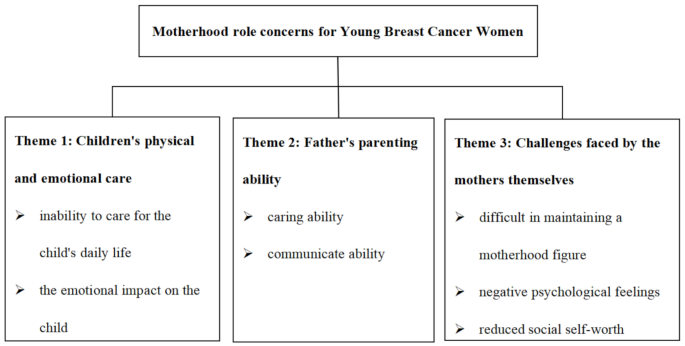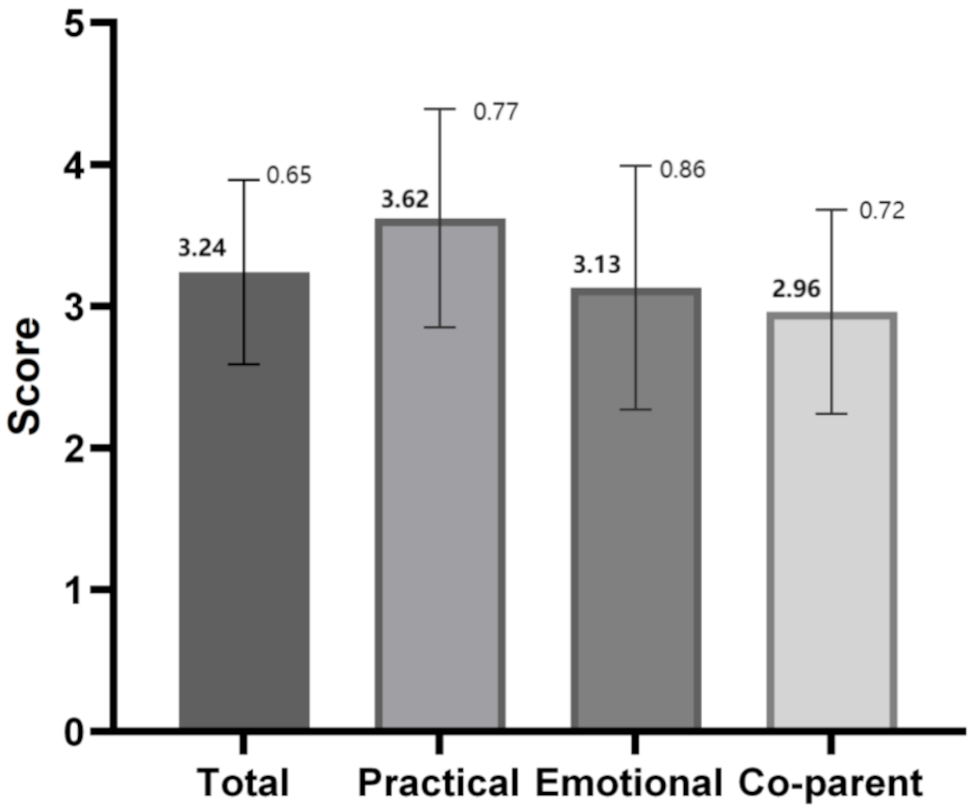Quantitative results
A total of 106 young women with breast cancer were included, with a mean age of 35.72 ± 4.56 years. They had one to three dependent children with a mean age of 12.43 ± 3.25 years. The patients had an educational level above junior high school. The socio-demographic characteristics of the patients are shown in Table 1.
The mean score of PCQ in young breast cancer patients was 3.24 (SD = 0.65). The subscale with the highest score was “practical impact of illness on child” (M = 3.62, SD = 0.77), followed by “emotional impact of illness on child” (M = 3.13, SD = 0.86) and “concerns about co-parent” (M = 2.96, SD = 0.72) (Fig. 1).
Scores of young breast cancer women’s PCQ
As shown in Table 1, there were four factors associated with PCQ total score (p < 0.05): the TNM stage, treatment stage, number of children, children’s age. All four variables were entered into the PCQ regression model. Number of children showed the strongest positive association with parenting concers (coefficient = 0.660), while children’s age was strongest negatively associated with parenting concers (coefficient = -0.555) (Table 2).
Qualitative results
Twenty patients participated in the qualitative study and their general socio-demographic details are shown in Table 3. Patient interview duration ranged from 27 to 62 min (mean duration 41 min). Forty-one codes were first obtained from the interview content, and seven sub-themes were obtained through comparison and clustering, with three themes further refined (Supplementary Material). This study identified three aspects of motherhood-related concerns among young women with breast cancer: children’s physical and emotional care, father’s parenting ability, and challenges faced by the mothers themselves (Fig. 2).

Motherhood role concerns for young breast cancer women
Theme 1: children’s physical and emotional care
All mothers mentioned concerns about the care of their children. This theme was further divided into two sub-themes: inability to care for the child’s daily life and the emotional impact on the child.
Inability to care for the child’s daily life
In everyday life, mothers acted as the main carers of their children. The debilitating physical condition imposed by the disease forced the mothers to reconsider the care of their children in terms of food, clothing, shelter, and academic supervision. The mothers’ concerns were related to the ability of their children to adapt to these changes in daily life and the impact of the illness on the children’s life and education.
“The child’s father is not very good at cooking. During the time I was hospitalized, the child could only eat what his father cooked. Now the child has lost weight. And his father can’t monitor his studies because he didn’t even ask about that before. I had to be anxious all the time I was in the hospital. I was also worried about money.” (P13).
The emotional impact on the child
After the illness, mothers noticed changes in their children’s mood. Children experienced negative emotions such as crying and sadness after learning of their mother’s illness. Mothers indicated that their children also expressed concerns such as fear of dying and not being able to continue to be with them, and confusion about the future. This resulted in feelings of distress and sadness among the mothers, who were anxious about causing emotional harm to their children.
“I’ve noticed that she (my daughter) has quietly cried several times since she knew I was sick. Her father has seen it too, and it saddens me that she has to worry about me at an age when she should be innocent.” (P7).
“My child asked if I would die and I felt her anxiety and fear that I would not be able to continue to be there for her.” (P12).
Theme 2: father’s parenting ability
The father’s caring responsibilities assume greater importance when the mother is ill. However, many mothers expressed concerns about the father’s ability to care for the children. This theme was further divided into two sub-themes: caring ability and communication ability.
Caring ability
In most families, mothers are usually the primary caregivers for the children, and fathers are responsible for helping out. However, after an illness, fathers have to take on more responsibility for education. Due to the fathers’ lack of proficiency in these aspects, mothers had to concern about various aspects of child care, such as dietary issues and transport, during their hospitalization. Moreover, many mothers reported that they were the primary contact with their child’s teachers. The fathers rarely, if ever, had any contact with the teachers and were not aware of their children’s learning status. Therefore, during the hospitalization period, many of the mothers continued to take on the task of communicating with their children’s teachers, which was exhausting for them.
“Their father also doesn’t have time to pick up and drop off the kids, and I need to be hospitalized. So childcare is a problem. Also, the children’s father didn’t even have contact with the teacher before. Now every week the teacher still talks to me about my child’s recent learning. I’m tired too but I can’t help it, there’s no one to help me share.”(P11).
Communication ability
During the mother’s hospitalization, fathers had more time to interact with their children. However, most fathers were not subtle and articulate enough while communicating with their children. Many mothers expressed concerns about the ability of the fathers to communicate with their children, fearing that something was not being handled well by the father and that it was affecting the parent–child relationship.
“His father communicates very little with him. His father is not good at expressing himself. I’m not at home and I’m afraid the two of them will have a conflict.”(P13).
Theme 3: challenges faced by the mothers themselves
In addition to their concerns about their children and co-parents, many mothers also expressed concerns about themselves. This theme was further divided into three sub-themes: difficulty in maintaining a motherhood figure, negative psychological feelings, and reduced social self-worth.
Difficulty in maintaining a motherhood figure
Many mothers reported that they have lost their breasts after breast cancer surgery and their hair after chemotherapy. They also experienced other problems such as poor color and lack of appetite that affected their image in front of their children. Mothers did not want their children to see them without hair or worried that they were too young and will be scared to see them, so they wore wigs or hats when they faced their children. Some mothers also avoided bathing in the shower with their children because they did not want their children to see their scars. Some mothers felt that breast cancer had also robbed them of their right to have children again, and they are afraid that they will not be able to have children again, in addition to worrying about the risks of doing so.
“I’m afraid to show my child that I have no hair left. I’m also afraid to show her my long scars. I think she would be scared. I may only be able to have this one child in my life. Because I heard that having another child might cause a recurrence, I am afraid.”(P10).
Negative psychological feelings
Disease-related communication, the child’s physical health, and their emotional problems were the issues that most mothers were anxious about. Mothers hesitated between hiding or informing their children; they could not choose. They felt that their children were too young to understand even if they were told the truth. Since breast cancer is a hereditary disease, they were even more anxious about their children’s health. The emotional problems caused by the disease also plagued them during their stay in the hospital.
“I don’t know if I should tell my child about my illness. I’m worried that telling her will psychologically burden her. I am also afraid that hiding it from her will make her even more upset if she finds out. The disease is also hereditary and I am even more worried that she might get sick too. I have not been in a good mood since the treatment.”(P12).
Reduced social self-worth
Many mothers felt that the disease disrupted the rhythm of their lives because they were young and needed to work. The treatment for the disease necessitated prolonged periods of hospitalization, forcing them to give up their jobs. Many mothers felt that their sense of self-worth had diminished, that their contribution to the family had diminished, and that they had become the ones who needed to be taken care of. They even had to avoid going to their children’s activities, which made them feel sorry for their children and fear that their social circle was shrinking.
“I’m only 32 years old and since I’ve been sick I haven’t been able to work. It’s been six months now and I’m still in treatment. I don’t feel like I have any value left. My children have parent–child sports day and I can’t attend. I’m feeling so poorly that I can’t even go out anymore.”(P18).
